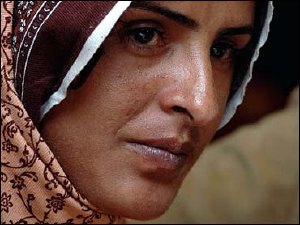Adil Najam
 This is a sad and difficult post to write.
This is a sad and difficult post to write.
Today, the Supreme Court of Pakistan gave its verdict on Mukhtar (Mukhtaran) Mai’s appeal against an earlier verdict by the Lahore High Court (LHC).
The three-judge bench decided to uphold the LHC verdict. This means that the earlier decision will hold; of the six accused of Mukhtaran Mai’s gang rape, five are acquitted and a sixth will complete the life imprisonment that had already been awarded to him.
The exact wording and precise details of the judgment are not yet available, but here are the details as of now, as reported in Dawn:
ISLAMABAD: Upholding the Lahore High Court’s verdict, the Supreme Court’s three-judge bench acquitted five out of six suspects in the Mukhtaran Mai case on Thursday, DawnNews reported. However, the sixth suspect, Abdul Khalique will complete his life imprisonment sentence, the court stated in its verdict.
Speaking to journalists outside the Supreme Court, Mukhtaran Mai voiced a lack of confidence on the verdict and said that she that had lost faith in the judicial system. Human Rights organizations also condemned the release of the suspects in the Mukhtaran Mai case. When asked about a review of the Supreme Court’s verdict, Mukhtaran Mai said she would take a decision on the matter after conferring with her lawyers.
Mukhtaran Mai was represented by public prosecutor, Advocate Atizaz Hassan.
In the Mukhtaran Mai case, Police submitted a challan against 14 suspects in the Anti-Terrorism Court in July 2002. The court declared the death sentence to six suspects and released the other eight. After the verdict of the Anti-Terrorism Court was handed out, five suspects were released by the Lahore High Court’s Multan bench. Whereas, one suspect’s death sentence was changed to life imprisonment.
“I did not receive justice today, hence I have left my fate in the hands of God,” Mukhtaran Mai said while speaking to journalists from her house later. “The release of the suspects has put my life in grave danger,” she added.
We have written before about our respect for Mukhtar Mai, and how I have admired the grace and dignity under adversity that she has come to embody (here, here and here). I have detailed my own encounter with her and recounted how I saw this grace and dignity in practice. My view of her as a person and my dejection – certainly sadness, and even anger – at the decision of the three-judge bench cannot, therefore, be a surprise to anyone.
The verdict is not just a blow for Mukhtaran Mai (and the release of the accused could heighten the treats against her life) but it can and will be seen as another limp response to rape as a crime, a reflection of societal chauvinism, and a blow to womens’ rights in the country. Most importantly, the practical manifestation of the decision will be to deny closure to and to bring back into painful scrutiny the life of a woman who has already been through so much – too much – pain.
 For all these reasons I am sad and angry at the decision. Of course, I realize that courts are meant to make decisions on the evidence available and the laws as stated (in principle, the system of justice works only if the idea that everyone – even the patently guilty – is innocent until proven guilty) and also that to accept the principle of an independent judiciary is also to accept the fact that the judiciary will sometimes make decisions that we will not like or agree with. Since I was not privy to the proceedings or to the details of the judgment from the three-judge bench, I do not know the legal minutia on which the judges made their decision. But, this is what I do know: I know that the social and political shadows of this decision will be deep and long – certainly for Mukhtaran Mai herself, but for all women, and for all of society in Pakistan.
For all these reasons I am sad and angry at the decision. Of course, I realize that courts are meant to make decisions on the evidence available and the laws as stated (in principle, the system of justice works only if the idea that everyone – even the patently guilty – is innocent until proven guilty) and also that to accept the principle of an independent judiciary is also to accept the fact that the judiciary will sometimes make decisions that we will not like or agree with. Since I was not privy to the proceedings or to the details of the judgment from the three-judge bench, I do not know the legal minutia on which the judges made their decision. But, this is what I do know: I know that the social and political shadows of this decision will be deep and long – certainly for Mukhtaran Mai herself, but for all women, and for all of society in Pakistan.
For all these reasons, I believe that the next step has to be to go back to the courts. I hope that Mukhtaran Mai will not allow the case to die just yet. My understanding is that the three bench decision can still be appealed once before the full bench of the Supreme Court. I hope that Mukhtar and her legal team will do so.
I realize the emotional cost of such a decision on Mukhtaran, especially given just how long this case dragged in the Supreme Court the first time around. But I also know the importance of doing so, if only for advancing the judicial discourse on this important issue.
What happened to Mukhtaran Mai cannot be reversed, nor will society’s imbeded prejudices be over-turned by any one decision. But for those of us who believe that societal sanction for violence against women has to be over-turned, the battle for justice must go on; no matter how disheartened, sad or angry we may be at any one decision on any one day.
On the Twitter account in Mukhtar Mai’s name, a recent message read: “No court can weaken my resolve to stand against injustice.” I cannot agree with that sentiment more.


















































Dr. Adil,
This is one of your most irresposible post EVER.
You did not read the detailed judgment nor were you present during the proceedings and yet here you are showing your disgust. You seems so sure about their crime as if yuo were there when/if she was raped.
What if the guys are really innocent?
I have no reason to believe that the verdict was influenced in any way. She had the best legal team working for her.
so, we must respect the decision and the courts.
Verdict was the Judges screamed for help!
With all their life long reading about the justice, they still finished the 20 remaining lashes on the dead victim.
None of the commentators have not raised the most important point in an Islamic nation wherrein the Sharia says a mans testimony is in value double that of a woman. In gang rape cases the more men give evidence against a woman, she is doomed from the outset due to Sharia.
This just goes to show how State authorities ( ie. police ) can’t gather evidence against criminals. How many people go free because our police is incompetent.
It is important to modernize police force if we are to check crime in Pakistan.
Reading the whole judgment you will find that how difficult it will be for women to prove her gang rap in future in Pakistan, she would have to ensure the following when rapist commit rape with her.
1. Have a well lit room, if there is no electricity than arrange generator. The darkness in the room may cast doubt on the presence of rapists in the room.
2. Ensure that she after the rape immediately go for a DNA and semen test to prove 4 or more person had intercourse with her, in order to prove that “gang” rape was committed she must bring the test report which shows that more than one person had intercourse with her.
3. Ensure that she had enough marks on her body even after few days of the incident to prove her struggle. if there are no marks then either only one person committed intercourse with her or she was not on “bare floor” or she did not “struggle”.
4. Ensure that she tells everybody in the village and better come on the tv channel (there are so many of them now) to announce she has been gang raped.
5. Ensure that while running out of the room after the rape , she remembers whether she was holding “shalwar” in her hand or forgot it in the room.
6. Finally all the “rapists” are innocent until proven “without a doubt” that each of them actually committed the intercourse. Hence if any one present at that time does not commit the intercourse , the victim should request them to do so. Otherwise benefit of doubt will be given to all the rapists.
7. It is important for the victim to understand that rapists belong to “respectable” family , they would not commit rape in their own home , therefore it will be in the benefit of the victim to “arrange” the rape in her own home. Otherwise keeping in account the “respectability” of the rapist’s family, benefit of doubt will be given to rapist.